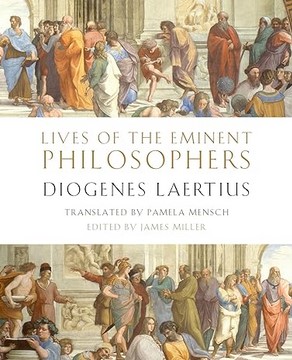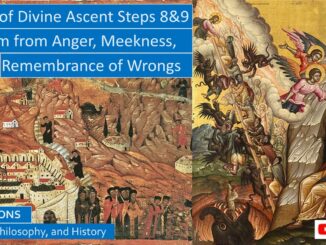
Who were the Cynic Philosophers? What was the philosophy of the Cynics?
We should avoid the temptation to rush to google what the word “cynicism” means, for there is no good parallel to anything in either our modern culture or to our historical medieval culture. We should let the Cynic philosophers define their own terms and not be distracted by our own modern cynicism. We can say that Greek Stoic philosophy was heavily influenced by the Cynics, as Zeno first studied under the Cynic Crates.
Please view our YouTube video on this topic: https://youtu.be/zAAal5p8AX8
Scholar and Stoics alike wish that at least some of the intact works of the Greek Cynic and Greek Stoic philosophers, but the summaries of Diogenes Laertius, sometimes revealing, sometimes shallow, always cursory, is pretty much all that has survived, except when Seneca and the later Stoics repeat their ideas. Athens was the Berkeley of the ancient world, that the Cynics were contrarians, like our sixties flower children, minus the drugs, but with the same disregard for material success and authority figures. The Cynics were always questioning the norms of their day.
Like the Greek Stoic philosophers, none of the complete works of the Cynics were copied by the medieval scribes or otherwise preserved, most of what we know about the Cynics are in their chapter in the “Lives of the Eminent Philosophers” by our friend Diogenes Laertius, which means we are only told what he thought was interesting. But his preference in describing the philosophy by means of the pithy sayings and quick stories about the philosophers is well suited to drawing a picture of the Cynics.
Clarification: Diogenes Laertius compiled the book, “Lives of Eminent Philosophers,” and the most influential and interesting Cynic philosopher in the Lives is also named Diogenes, or Diogenes of Sinope.
Diogenes Laertius tells us the Cynics were only interested in ethics, and unlike the other philosophical schools, they had no interest in logic and physics, much like the later Roman Stoics. They had no interest in general education or literature, their only concern was how to live a life of virtue. The Cynics “lived frugally, eating only for nourishment, wearing only a clock, despising wealth, fame, and royal birth.” Some ate only vegetables, some drank only water, some lived in tubs in the marketplace, like Diogenes of Sinope. The Cynics believed that “virtue can be taught, and when acquired cannot be lost.”[1]
ANTISTHENES, THE FIRST CYNIC PHILOSOPHER
Antisthenes, the first Cynic philosopher, walked five miles a day to listen to Socrates, finding inspiration in his simplicity and his hardiness, adopting his ascetic practices. He emulated the impassivity of Socrates, he refused to allow base passions to rule his life. Once when a student asked what he should bring to his lectures, he replied, “A new book, a new pen, and a new tablet,” meaning he should bring with him an eagerness to learn. He was not concerned about the number of students who attended his lectures, sometimes he boasted he chased away unappreciative students with a silver staff.
Diogenes Laertius records many of his pithy sayings:
“I would rather go mad than feel pleasure.”
He counseled humility. “You should learn from the knowledgeable that the faults you possess can be avoided.”
It would be better to fall in with crows than flatterers (in Greek, korokas vs. kolakas), for you are devoured by crows when dead, but by flatterers when you are alive.”
“Pay attention to your enemies, for they are the first to notice your faults.”
One saying reminds us of what Jesus once said. “Reproached one day for associating with worthless men, he said, ‘Doctors associate with patients without falling into a fever themselves.’ “
“When asked what advantage he enjoyed from philosophy, he said, ‘To be able to live in company with oneself.’ “
Antisthenes sought to prove that virtue could be taught, that to be virtuous is to be noble. Virtue is all that is needed for happiness, “since it needs nothing but the strength of Socrates. Virtue is a matter of deeds and needs no abundance of words or learning.” The wise man needs only the law of virtue to govern his behavior, he does not need written laws. Virtue is a weapon that cannot be taken from you.[2]
DIOGENES OF SINOPE, LIVING IN A TUB IN THE SQUARE
Diogenes was an exile in Athens who wanted to study under Antisthenes. Although Antisthenes threatened him with his staff, Diogenes was obstinate, he wanted to be his student, he shouted, “Strike, for you’ll not find wood hard enough to keep me away from you, as long as I think you have something to say.” Diogenes was just as contrary, when a young fellow wanted to study under him, “he gave him a fish and told him to follow him. The man, thinking he had been insulted, threw the fish away and departed. Later Diogenes said to him, ‘A fish has destroyed our friendship.’ “
Diogenes noticed a mouse scurrying about in Athens, and he decided that, like the mouse, he would be concerned about where he lived, so he lived in a tub, a large earthenware pot near the public buildings. When he saw a boy drinking water with his hands, he threw away the cup he owned, and later he threw away his bowl. He went barefoot even in the winter, his possessions consisted of a clock and what he could carry in a knapsack. When Alexander the Great sought him out in Corinth, he told Diogenes, “Ask for whatever you desire.” Diogenes replied, “Stand out of my light.”
While Socrates was a gadfly, Diogenes was a wasp. “He was quick to heap scorn on others,” especially those who chased fame or wealth. “He called the school of Euclides file, Plato’s discourses a waste of time, the games at the Dionysia a spectacle for morons, and he call demagogues the lackeys of the mob, and their crowns the pustules of fame.”
There are many stories of Diogenes baiting Plato, his contemporary. He heard Plato discussing with his students the perfect forms of tables and cups. Diogenes responded that his eyes could see tables and cups, but not ideal table-hood and cup-hood in the heavens. Another time, when Plato defined a man as an animal with two legs and no feathers, Diogenes plucked a cock and brought it to Plato’s school, saying “This is Plato’s man.” Once, when invited to Plato’s house, when trampling on his carpets, he said, “I trample on Plato’s pomposity.” To which Plato replied, “How much vanity you expose, Diogenes, by not appearing to be vain.”
Plato gave Diogenes his nickname, “the Dog.” Diogenes said that “though he was a dog of the kind that men admire, none dared to take him along on a hunt.” “Once when Alexander the Great came to him and said, ‘I am Alexander, the Great King,’ he replied, ‘And I am Diogenes, the Dog.’ When asked what he had done to be nicknamed the Dog, he said, ‘I fawn on those who give me something, bark at those who don’t, and bite the wicked.’ “
Later in life, when he was traveling, he was captured by pirates and sold into slavery in Corinth. When asked what he was good at, he replied that he was best at ruling men, that whoever bought him was buying their master. He told his purchaser, Xenaides, that since slaves who are doctors or pilots are obeyed, then he must be obeyed also. He was tasked with training the sons of Xenaides, he taught them how to ride and how to hunt. He had them memorize many works of poets and philosophers, and how to lead the ascetic life of a Cynic, “living on plain food and water, wear their hair short and unadorned, to go barefoot without a tunic, and to be silent and keep their eyes lowered when walking in the streets.” Xenaides was so grateful for his services that he told his neighbors, “A kindly deity has entered my house.” Diogenes grew old in his service and asked to be buried next to his sons.
When his friends offered to ransom him, he refused, saying that “lions are not the slaves of those who feed them; it is the feeders, rather, who are the lions’ slaves. For fear is the mark of a slave, and wild beasts make men fearful.”
We see a parallel with the later Roman Stoic Epictetus, who was a former slave owned by a former slave. To Epictetus, only the good can be truly happy, only the good can truly be free, tyrants may take all you own, but they can never take your most prized possession, your freedom of will; tyrants can throw you in jail, but they can never take away the freedom of your mind; tyrants can take your life, but they can never have your soul. Epictetus, the great philosopher of freedom, was a former slave, a slave to a freed man, and was both poor and a cripple, eking out a living by teaching philosophy.
http://www.seekingvirtueandwisdom.com/epictetus-discourses-blog-1/
Likewise, St Paul reminds us, “There is no longer Jew or Greek, there is no longer slave or free, there is no longer male and female; for all of you are one in Christ Jesus.”[3] There is another interesting blog on this verse:
https://www.biblicalarchaeology.org/daily/biblical-topics/bible-interpretation/galatians-3-28/
Diogenes had other sayings. “After listening to two lawyers wrangling, Diogenes condemned them both, saying that whereas the one had undoubtedly stolen, the other had not lost anything.”
“Diogenes once said to someone who was having his shoes put on by a servant, ‘You won’t be content until he wipes your nose for you; but that day will come, once you’ve lost the use of your hands.’“ How true this is today, often we see home health nurses pushing the wheelchairs of their elderly charges in restaurants, rarely are the other family members joining them.
“When short of money Diogenes would tell his friends that he was not asking them give him money, but to give it back.” “He reasoned this way: all things belong to the gods; the wise are friends of the gods, and the possessions of friends are held in common; therefore, all things belong to the wise.”
“To someone who reproached him for going to unclean places, he said, ‘The sun, too, visits dung heaps without being defiled.’ “
Diogenes Laertius records many sayings of Diogenes of Sinope.
“People exert themselves when exercising at the gymnasium but make no effort at strengthening their character.”
Musicians take the trouble to tune their lyres while their souls are disordered.
Living itself is not an evil, the evil is living badly.
“When observing a boy tossing stones at the cross of a gallows, he said, ‘Well done! You’ll get there yet!’ “
“To get through life you need either reason or a noose” (Greek, logon vs. brochon).[4]
A footnote explains that Diogenes’ practice of masturbating in public is mentioned twice in the Lives of Eminent Philosophers, that “it was not some perverse personal quirk of Diogenes, but rather an especially dramatic way to challenge conventional inhibitions and taboos.” Maybe the modern equivalents are streaking and breastfeeding in public, or the hippie expressions of free love. Ancient Greece was surely a remarkable place to tolerate such eccentric and subversive behavior.
“Seeing a lad behaving effeminately, Diogenes said, ‘Aren’t you ashamed to fall short of nature’s intentions for you? For she made you a man, but you’re making yourself play the woman.’ “
Cynics were wary of the passions. “Servants are the slaves of their masters, and unworthy men the slaves of their passions.”
CRATES AND HIPPARCHIA
Diogenes Laertius mentions several other Cynic philosophers, among them Crates, under whom the Stoic Zeno of Citium studied. “He said that his native land was obscurity and poverty.” Crates also said that “we should study philosophy to the point where we discern that our generals are mere donkey drivers.” Some of his sayings include:
“Those who surround themselves with flatterers are as friendless as calves among wolves; for neither the former nor the latter have anyone to protect them, but only the sort who plot against them.”
“It is impossible to find anyone who has no flaw; for just as in a pomegranate, there is always a rotten seed.”
Like the other Cynic philosophers, he was wary of the passions controlling our lives, he was not libertine, and we have no mention of kind words for effeminate boys. Also, “he constantly reproached the courtesans, training himself to endure their abuse.”[5]
But we do have some odd references on how the Cynic philosophers would both masturbate and copulate in public. The last observation refers to this very odd girl Hipparchia who fell madly in love with Crates, which should encourage nerds who have a hard time finding love.
I can’t improve on Diogenes Laertius: “Hipparchia fell in love with Crates and with his discourses and his life. She paid no attention to any of her other suitors, or to wealth, or noble birth, or beauty. Instead, Crates was everything to her. And what is more, she even threatened his parents, saying that she would commit suicide unless she were given to him. Crates, therefore, when entreated by her parents to dissuade their daughter, did all he could; but at last, failing to persuade her, he stood up, took off his clothes in front of her, and said, ‘This is the bridegroom, and this is his property; think it over! For you will be no companion for me unless you adopt my way of life.’”
“Hipparchia accepted and, after adopting the same dress, went about with her husband and consorted with him in public, and attended dinners with him.” And she has many sayings too, though we only hear of one,[6] perhaps she helped her husband her lectures.
So in one respect Crates is like any other guy, warning his beloved, “I am who I am, so don’t go trying to change me.” What a charming story, what a crazy story. This could never happen at Berkeley, this could only happen in ancient Athens or Corinth, only the Greeks could tolerate such gadflies and wasps of philosophers.
This probably qualifies as the most peculiar marriage proposal in recorded human history. Many questions puzzle scholars. Was there a real wedding, and did the parents attend? Did they sleep in separate pots, or was the pot in the marketplace big enough for both of them? Did they only consort after dark? Was Crates forced to get a real job after they had kids? Perhaps further research can shed light on these and many ther questions, but Diogenes Laertius does say Crates lived to a ripe old age, living a happy life.
[1] Diogenes, “Lives of Eminent Philosophers,” translated by Pamela Mensch, (New York: Oxford University Press, 2018), Book on the Cynic Philosophers, Book 6: 103-105, pp. 308-309.
[2] Diogenes Laertius, “Lives of Eminent Philosophers,” Book 6: 1-12, pp. 260-264.
[3] https://www.biblegateway.com/passage/?search=Galatians+3%3A28&version=NRSVCE
[4] Diogenes Laertius, “Lives of Eminent Philosophers,” Book 6: 20-75, pp. 269-294.
[5] Diogenes Laertius, “Lives of Eminent Philosophers,” Book 6: 20-75, pp. 269-294.
[6] Diogenes Laertius, “Lives of Eminent Philosophers,” Book 6: 96-98, pp. 305-306.





7 Trackbacks / Pingbacks